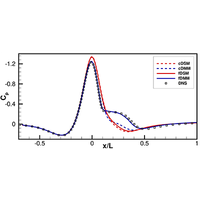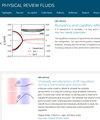Efficient dynamic mixed subgrid-scale model
IF 2.5
3区 物理与天体物理
Q2 PHYSICS, FLUIDS & PLASMAS
引用次数: 0
Abstract
It is well known that the scale-similarity class of subgrid models have a high correlation with the actual subgrid stresses in a priori tests. However, these models are typically underdissipative and not robust enough to be practically useful for large-eddy simulation. On the other hand, the dynamic Smagorinsky model (DSM), which is a popular subgrid model, is sufficiently dissipative and robust, but has a lower correlation with actual subgrid stresses in a priori tests. There have been many successful attempts to combine the two models into a “mixed” subgrid model that have typically retained the favorable properties of both. However, most dynamic mixed models require two or more levels of test filtering beyond the (often implicit) grid filtered quantities that are solved, in contrast to a single test filtering operation for the dynamic Smagorinsky model. The additional cost involved in test filtering has likely hindered the widespread use of dynamic mixed models in production codes. We propose an efficient dynamic mixed model that is constrained to have the same subgrid dissipation as the DSM model, and only requires a single level of test filtering. Thus, the additional computational cost is negligible compared to the DSM model. A posteriori simulations of the turbulent channel flow reveal that the proposed mixed model is as robust as the DSM model, and more accurate on coarser grids. Notably, smooth-body turbulent separation is better captured by the new model when combined with a standard wall model.

高效动态混合亚网格尺度模型
众所周知,尺度相似类子网格模型与先验测试中的实际子网格应力具有很高的相关性。然而,这些模型通常耗散不足,不够稳健,对大涡模拟没有实际意义。另一方面,动态 Smagorinsky 模型(DSM)是一种流行的子网格模型,具有足够的耗散性和鲁棒性,但在先验测试中与实际子网格应力的相关性较低。将这两种模型结合成 "混合 "子网模型的成功尝试很多,通常都保留了这两种模型的有利特性。然而,大多数动态混合模型在求解的网格滤波量(通常是隐含的)之外,还需要两级或更多级的试验滤波,而动态斯马戈林斯基模型只需进行一次试验滤波操作。测试过滤的额外成本很可能阻碍了动态混合模型在生产代码中的广泛应用。我们提出了一种高效的动态混合模型,它受限于与 DSM 模型具有相同的子网格耗散,并且只需要单级测试滤波。因此,与 DSM 模型相比,额外的计算成本可以忽略不计。湍流通道流的后验模拟显示,所提出的混合模型与 DSM 模型一样稳健,而且在更粗的网格上更为精确。值得注意的是,当新模型与标准壁模型相结合时,新模型能更好地捕捉平滑体湍流分离现象。
本文章由计算机程序翻译,如有差异,请以英文原文为准。
求助全文
约1分钟内获得全文
求助全文
来源期刊

Physical Review Fluids
Chemical Engineering-Fluid Flow and Transfer Processes
CiteScore
5.10
自引率
11.10%
发文量
488
期刊介绍:
Physical Review Fluids is APS’s newest online-only journal dedicated to publishing innovative research that will significantly advance the fundamental understanding of fluid dynamics. Physical Review Fluids expands the scope of the APS journals to include additional areas of fluid dynamics research, complements the existing Physical Review collection, and maintains the same quality and reputation that authors and subscribers expect from APS. The journal is published with the endorsement of the APS Division of Fluid Dynamics.
 求助内容:
求助内容: 应助结果提醒方式:
应助结果提醒方式:


